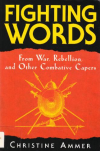

| Book of the Month | ||
 |
Fighting Words |  |
Publisher: Contemporary Publishing Company
Authors: Christine Ammer
US$6.95 (approx)
ISBN 978-0844202853
The sub-title to this book tells us that these are idioms collected from 'War, Rebellion and other Combative Capers'. It may seem surprising that a whole book should be dedicated to military idioms, but many of these idioms have travelled far from the battlefield and now make up a part of everyday language and culture. Someone dressed in a balaclava, cardigan and wellingtons who is whining about his wardrobe might be interested to know that the balaclava is named after a battle, and the cardigan and wellington after the soldiers who made these items of clothing popular. Furthermore, the 'wardrobe' was originally used to protect clothes and weapons plundered from an enemy camp after a battle, and even 'whining' comes originally from an old English word meaning 'the sound of an arrow in flight'. All these facts and many more have been collected by the author who has also written a Dictionary of Cliches, a Dictionary of Idioms and many similar books.
Most of the 300 or so pages in the book consist simply of idioms arranged from 'about-face' (to completely change one's policy on something) to 'zero in' (to focus tightly on a particular topic). Over the rest of the book, the author passes on some fascinating facts and trivia - such as that white flags were originally used as a sign of peaceful intentions over two thousand years ago, or that a 'deadline' was originally a line which prisoners of war would be shot if they crossed. Occasionally there are small errors - for example 'under the aegis of' now refers to those responsible for making sure things go well. (e.g. 'The meeting was held under the aegis of the Red Cross'). However, the owner of the original 'aegis' was Athena, and not Zeus as the author claims. There are occasional pictures in the form of black-and-white line drawings, but these break up the text without being particularly interesting. More useful are short quotes from poetry and literature showing words in the context in which they are now used. For example a quote from Dickens illustrates the word 'humbug' for someone who talks rubbish in a knowledgeable way. (The word comes from 'Hamburg' a city which was once famous for sending out unreliable war reports.)
Who is this book for? Anyone interested in the origins of English words will find much to surprise and inform them in this book. For students, the book has two purposes. Firstly, knowing idioms helps to make one's language richer and more colloquial, and secondly an interesting story about an idiom helps one to learn it correctly. This book would be a valuable addition to a language school library, and many EFL teachers will find it useful for giving students extra information about a word or phrase.
Verdict: Interesting but not essential.
Assessment 6/10